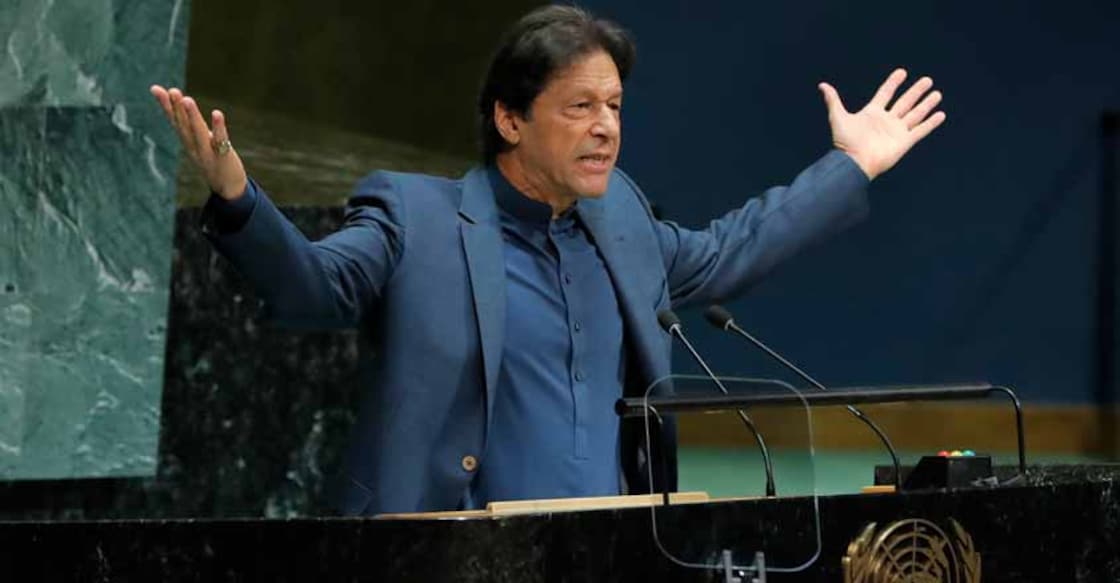Imran Khan warns of 'bloodbath' when Kashmir curfew is lifted

Mail This Article
United Nations: Pakistan Prime Minister Imran Khan warned on Friday there would be a bloodbath once India lifts its curfew in disputed Kashmir and that any all-out conflict between the two nuclear-armed nations would reverberate far beyond their borders.
Khan made the remarks in an impassioned speech to the annual United Nations General Assembly after India last month removed the decades-old autonomy in the part of Kashmir it controls and detained thousands of people.
"If this goes wrong, you hope for the best, but be prepared for the worst," Khan said.
"If a conventional war starts between the two countries ... anything could happen. But supposing a country seven times smaller than its neighbor is faced with the choice – either you surrender or you fight for your freedom till death?
"What will we do? I ask myself this question ... and we will fight. ... and when a nuclear-armed country fights to the end, it will have consequences far beyond the borders."
In its clampdown in the Indian-controlled part of Kashmir, which has a Muslim majority, India flooded the territory - already one of the world's most militarized zones - with troops.
It imposed severe restrictions on movements and cut all telephone, mobile phone and internet connections. Thousands of people were arrested.
New Delhi has since eased some of the curbs, although no prominent detainees have been freed and mobile and internet connections remain suspended.
While warning of the consequences of lifting what he described as an "inhuman curfew," Khan demanded India do so and free all detainees.
He sketched out a scenario under which he said he would pick up arms if had been forced to live under curfew, to witness rapes and to suffer humiliation.
"I picture myself. I am in Kashmir. I have been locked up for 55 days ... and there are rapes, Indian army going into homes, soldiers. Would I want to live this humiliation? Would I want to live like that? I would pick up a gun," he said.
"You are forcing people into radicalization."
Muslim-majority Kashmir has long been a flashpoint between nuclear-armed India and Pakistan, which have fought two of their three wars over the divided territory. Both countries rule parts of Kashmir while claiming it in full.
Khan addressed the United Nations a day after the senior U.S. diplomat for South Asia called for a lowering of rhetoric between India and Pakistan, while saying that Washington hoped to see rapid action by India to lift restrictions it has imposed in Kashmir and the release of detainees there.
Khan took direct aim at Indian Prime Minister Narendra Modi in his speech and accused him of being a "life member" of Rashtriya Swayamsevak Sangh, a Hindu nationalist organization that he said believed in the "ethnic-cleansing" of Muslims.
The RSS denies any prejudice against Muslims but says it is opposed to appeasement of any community.
Modi, in his address to the U.N. assembly shortly before Khan spoke, made no mention of Kashmir, or Pakistan, concentrating mainly on Indian's efforts to protect the environment.
In Pakistan’s portion of Kashmir where many in recent days have been waiting keenly for Khan's address, people were glued to their television sets.
Sohail Iqbal Awan, a lawyer and political activist from the PML-N party, a rival to Khan's, praised the speech and predicted that the United Nations would have to "open its closed ears, eyes and mouth" on the Kashmir issue.
"As a Kashmiri, I felt proud at his balanced, comprehensive and well grounded speech ... despite being his political opponent I am compelled to shower praise on him," he said.
U.S. President Donald Trump met separately with both Modi and Khan on the sidelines of the U.N. gathering. Trump urged Modi to improve ties with Pakistan and "fulfill his promise to better the lives of the Kashmiri people," the White House said.

